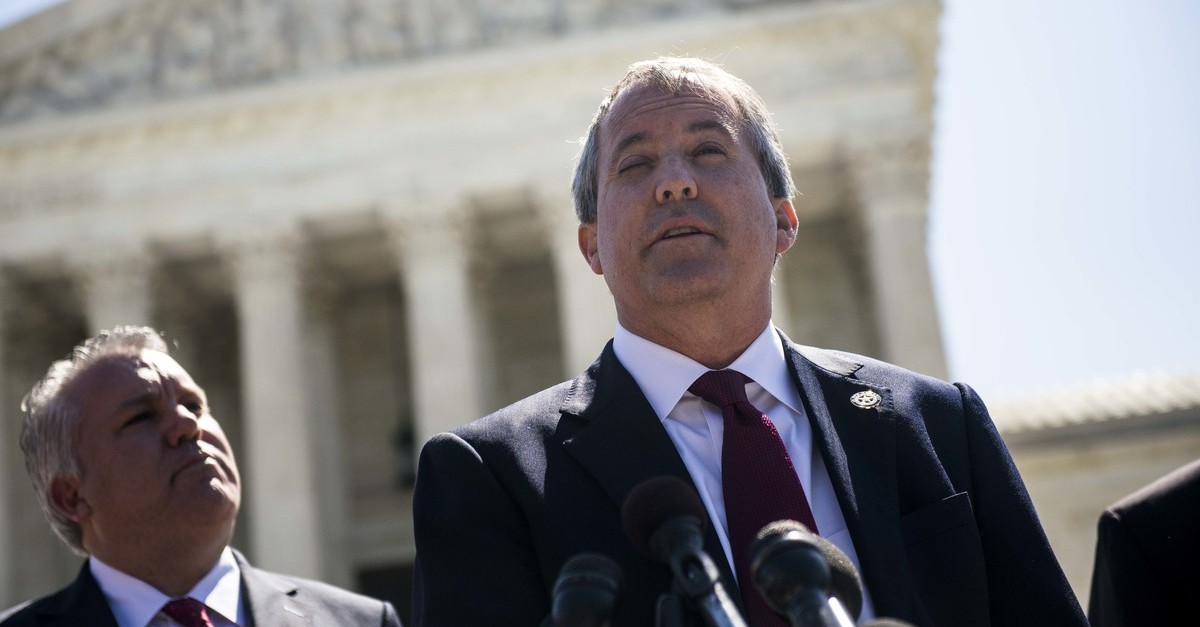
Texas AG Ken Paxton
A three-judge panel on the U.S. Court of Appeals for the Fifth Circuit ruled against Texas Democrats on Thursday, holding that even during a global pandemic healthy Texans under 65 years old do not have a Constitutional right to vote by mail.
A group of three Texas voters under 65, together with the Texas Democratic party, sued Texas Republican Governor Greg Abbott, Texas Secretary of State Ruth Hughs (R), and Texas Attorney General Ken Paxton (R) over the state’s strict vote-by-mail statute.
The statute, Tex. Elec. Code ch. 64, allows early voting by mail only for voters who: (1) anticipate being absent from their county of residence; (2) are sick or disabled; (3) are 65 years of age or older; or (4) are confined to jail. Paxton sent a letter to Texas judges and election officials in early May, explaining how to interpret the statute. The letter ordered public officials to refrain from advising voters—whose sole basis for requesting a mail-in ballot was fear of contracting COVID-19—that they should seek absentee ballots. The letter warned that if any official advised voters otherwise, they could be subject to criminal liability under the Texas Election Code.
In response, voters and the Democratic Party sued. In their lawsuit, plaintiffs argued for a wide interpretation of the term “disabled;” they contended that in the context of the COVID-19 pandemic, under the statute’s authorization for the disabled, “any eligible voter, regardless of age and physical condition” should be permitted vote by mail “if they believe they should practice social distancing in order to hinder the known or unknown spread of a virus or disease.”
Further, the plaintiffs argued that the Texas law interferes with under-65 voters’ voting, and on that basis, it violates the Twenty-Sixth Amendment’s prohibition against denying or abridging the right to vote on account of age.
The Fifth Circuit disagreed with Plaintiffs on both counts. Judge Leslie H. Southwick (a George W. Bush-appointee) wrote for the panel, which also included Judge Carolyn Dineen King (a Jimmy Carter appointee), and Judge Carl E. Stewart (a Bill Clinton appointee). Judge Southwick wrote that, even during a pandemic, “fear of contracting COVID-19 unaccompanied by a qualifying sickness or physical condition does not constitute a disability under the Texas Election Code for purposes of receiving a ballot by mail.”
On the constitutional challenge, the Fifth Circuit also ruled against the plaintiffs. Making things easier for one group, held the court, does not constitute a deprivation of rights to another. The Twenty-Sixth Amendment, approved by Congress in March of 1971 and ratified by June, became the most quickly ratified amendment in U.S. history. It changed the voting age from 21 to 18, and according to the Fifth Circuit, the speed at which it was ratified “is some indication that the Twenty-Sixth Amendment was at least perceived as having a narrower sweep than the other constitutional amendments affecting voting […].”
Texas’s narrow statute, which does not permit for mail-in voting for all voters, does not constitute a denial or abridgment of the right to vote. It would only have, ruled the court, if it made voting “more difficult for that person than it was before the law was enacted or enforced.”
In the court’s reasoning, it noted that the plaintiffs failed to give enough direct mention to COVID-19. The court contrasted the plaintiffs’ pleadings in the case with a parallel action filed in state court, saying that the state brief “places COVID-19 front and center.” By contrast, the federal brief, “almost never refers to COVID-19,” with the exception of “a few, one might even say stray, usages of the pandemic to support their arguments.”
Read the Fifth Circuit’s ruling here.
Plaintiffs will next decide whether to request a en banc rehearing before the full Fifth Circuit Court of Appeals.
[image via Gabriella Demczuk/Getty Images]